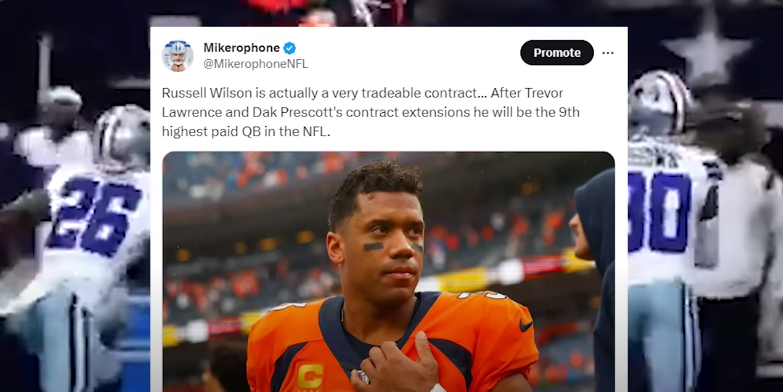The Uncertain Future of Russell Wilson with the Denver Broncos
In the high-stakes world of the National Football League (NFL), the future of one of its most prominent quarterbacks hangs in the balance. Russell Wilson, who has been a staple under center for years, now faces an uncertain future with the Denver Broncos, a team he joined amid much fanfare. Recent reports suggest that Wilson foresees his departure from the team, a move that has sent shockwaves throughout the sports community.
The Denver Broncos made the difficult decision to bench Wilson in favor of backup quarterback Jarrett Stidham, sending a clear message about their plans for the franchise. This strategic pivot by head coach Sean Payton was aimed at reinvigorating an offense that has struggled to find its rhythm. The benching wasn't merely an isolated incident but a precursor to what might be the end of Wilson's tenure with the Broncos.
The crux of the matter is Russell Wilson's financial ties to the Denver Broncos and his performance. Wilson is poised to receive a guaranteed $39 million for the upcoming season, a hefty sum that impacts team budgeting and salary cap space. On top of that, there’s an additional $37 million in injury guarantees for the year 2025. Cutting him before these dates crystallize into fiscal responsibility could save the Broncos a large sum of money, albeit still leaving a substantial cap hit.
The evidence for this turn of events is rooted in the team’s recent performance and the quarterback's contractual situation. After a lackluster season in 2022, the Broncos have continued to grapple with offensive woes. According to ESPN, they rank disappointingly in various offensive metrics, with indicators such as scoring, third down conversions, red zone efficiency, passing, and goal-to-go situations painting a picture of underperformance. This has culminated in the team holding a low 8% chance of making the playoffs, as reported by NFL.com.
These statistics are telling. They articulate a narrative of unrealized potential and expectations not met. Denver’s offensive struggles aren't new, but they are magnified when seen through the prism of high investment costs, both in draft capital and financial commitment. Wilson's contract is a testament to the faith and expectation that the Broncos had placed in him - a faith that, thus far, appears to have been misplaced. If we break down the financial aspect further, it's clear that Denver's management is assessing the price-to-performance ratio and finding it lacking.
This brings us to the broader implications of the situation. The Broncos organization is exploring every viable route to shift their trajectory to one more conducive to winning championships. The decision to bench and potentially cut Wilson is not purely a reflection on his abilities, but a fiscal and strategic necessity in a sport where the salary cap and prudent budgeting are as crucial as talent on the field.
A significant point in Wilson's narrative with the Broncos is the condition of his contract concerning injury guarantees. This adds a layer of complexity to any potential release. If the Broncos release Wilson after the specified date in March, they are liable for the injury guarantees, unless they have valid medical reasons for the termination.
The Denver Broncos reached out to their starting quarterback with a clear ultimatum: defer the injury guarantee trigger date or face being benched for the rest of the season. This maneuver, as reported by the Athletic's Dianna Russini, also involved legal teams, including representatives from the NFL Players Association (NFLPA). No adjustments to Wilson's contract were made, leaving the team at a financial crossroads.
The implicated fiscal responsibility is colossal. If Denver were to cut Wilson outright, they would incur a staggering $85 million dead cap charge for the year 2024. A post-June 1st release designation provides some relief, but still mandates paying out a significant dead money amount spanning two seasons. The financial tapestry of the NFL is woven tightly with such fiscal deadlines and guarantees that neither players nor teams can afford to overlook.
Wilson's situation epitomizes the delicate balance in the NFL between player value and financial prudence. Wilson is a talented quarterback, a Super Bowl champion, and was once considered among the elite at his position. Yet, the potential financial burden of his remaining contract weighs heavily on Denver’s decision-making process. The franchise is legally bound to honor the contract or suffer the penalties. It is a high-risk game of chess between player management and fiscal responsibility.
Notably, Wilson hasn't spoken to the media about the current happenings within the organization. His silence leaves room for interpretation and speculation, but it also represents professionalism in an era where public outcries are common.
After the benching, Wilson expressed optimism about the future on social media, remaining poised amidst the turbulence. His demeanor indicates his understanding of the NFL's business nature and his readiness to move on.
Wilson's calm response to the situation perhaps reveals an acceptance of the realities of professional sports. His tenure with the Broncos may not have gone as expected, but his optimistic outlook may serve him well should he enter free agency. A testament to his professionalism, Wilson is handling the moment with the same grace he exhibited on his arrival at the Broncos.
Wilson's reaction to these developments strengthens his image and possibly his market value. Teams interested in veteran leadership and experience might be encouraged by his manner of dealing with adversity. Character is a valuable commodity in the NFL, and Wilson's actions under pressure could be just as intriguing to potential suitors as his on-field abilities.
In closing, the Denver Broncos’ handling of the Russell Wilson situation has far-reaching implications not only for the franchise but also for the quarterback himself. As discussions of his inevitable release unfold, it's undeniable that professional sports are a confluence of talent, strategy, and finance. The coming weeks and the choices made by the Denver Broncos could define their trajectory for years to come, and similarly, chart a new course for a quarterback of Russell Wilson's caliber. What is certain is that the NFL offseason is shaping up to be as enthralling as the games played on the gridiron, revealing strategies that oscillate between the locker room and the ledger.
F.A.Q.
Question 1.
Q.: What recent development has led to speculation about Russell Wilson's future with the Denver Broncos?
A.: Russell Wilson's future with the Denver Broncos has become the subject of intense speculation after he was bened in favor of backup quarterback Jarrett Stidham. This move, combined with a report from Dianna Russini of The Athletic, suggests that Wilson expects to be released by the team in March during the 2024 NFL offseason.
Question 2.
Q.: Why is the financial aspect of Russell Wilson's contract so significant in the discussion of his potential release from the Broncos?
A.: The financial implications of Russell Wilson's contract are significant because he is guaranteed $39 million for the next season, with an additional $37 million in injury guarantees for 2025, should he remain on the Broncos' roster by March 17, 2024. These terms mean that if he is released before this date, the Broncos would face substantial dead cap charges, making the economic impact a crucial factor.
Question 3.
Q.: How might releasing Russell Wilson affect the Broncos' salary cap situation?
A.: Should the Broncos decide to release Russell Wilson before March 17, they would incur $85 million in dead cap money for the 2024 season. If they opt for a post-June 1 release designation, it would result in $35.4 million in dead money for 2024 and an additional $49.6 million for 2025, according to Spotrac. These huge financial repercussions highlight the complexity of NFL contracts and the impact on team salary cap management.
Question 4.
Q.: Can you explain why the Broncos' decision to possibly cut Wilson is not purely based on his on-field performance?
A.: The Broncos' decision to potentially release Russell Wilson isn't based solely on his on-field performance. While the team's recent lack of success has been a factor, Head Coach Sean Payton emphasized that sparking the offense was the primary reason behind benching Wilson, not just the contractual economics. Nonetheless, the decision is likely influenced by a combination of financial, strategic, and performance considerations.
Question 5.
Q.: What are the potential landing spots for Russell Wilson if he is indeed released by the Denver Broncos?
A.: If Russell Wilson is released by the Broncos, several teams may express interest in the seasoned quarterback due to his experience and past success, including teams looking to add a veteran presence or those in need of a starting-caliber quarterback to raise their competitive level. Analysts have speculated about various landing spots, but concrete possibilities will become clearer once the offseason movements begin.
Question 6.
Q.: How did the past season's performance influence the Broncos' view on Russell Wilson?
A.: Russell Wilson's performance in the past season, which was below his usual standards, has certainly influenced the Broncos’ perspective. The team expected a turnaround in fortunes with the acquisition of Wilson but faced another season of offensive struggles, ranking poorly in several key statistical categories despite the hope that the arrival of Head Coach Sean Payton could bring about improvement. This gap between expectation and reality has been a critical part of the conversation regarding Wilson's future.
Question 7.
Q.: Is there any precedence in the NFL for a situation like Russell Wilson's with the Denver Broncos?
A.: Precedents do exist in the NFL for situations similar to that of Russell Wilson with the Denver Broncos, where high-profile players are released due to a mix of financial strain and underwhelming performance. The NFL’s salary cap regulations often compel teams to make tough personnel decisions to ensure the fiscal health and strategic success of the organization. Each case, however, is unique, and Wilson’s situation with the Broncos will be one for sports analysts to compare with future contracts and team decisions.


Comments
Post a Comment